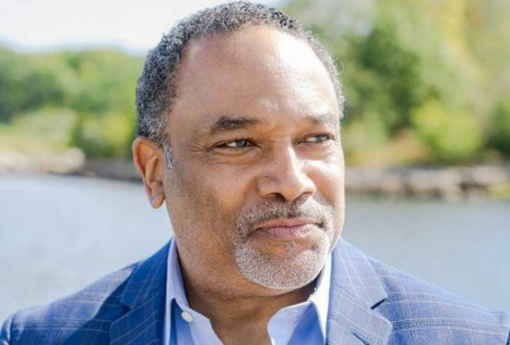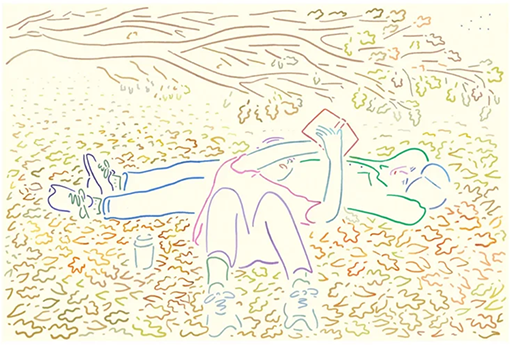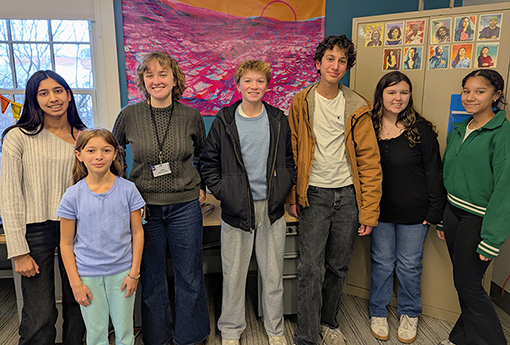
Reflections on Responsible Research: Throughout Her Career, Librarian Christine Smith Has Helped Us Search for Truth – and Find It
June 26, 2025

As students returned their borrowed books to the Prescott Library before heading off for break, Middle School Librarian Christine Smith P’07 made sure to thank each of them for remembering to bring back their materials. “And then I told them to have a good summer,” she adds. “One student looked at me for a moment before responding and said, ‘Thank you. Have a great life.’”
It was a funny reply, but understandable, too, because after 25 years of working at Wheeler, Ms. Smith is checking in those final books and then checking out of Wheeler and heading into retirement.
“I have mixed feelings about it,” she says. “There are people that I respect very much here, who I have enjoyed working with tremendously over my time in middle school, and people that I feel like whenever I’ve had the opportunity to collaborate with them, I learned from them. I would consider myself a lifelong student. I never assume that I know everything. I’m always wanting to learn more, and when I see someone who just really gets how to be a teacher and what they want the students to learn, I’m always so impressed and try to incorporate some of that into my own practice.”
“So I’m going to miss who I’m leaving behind, both children and adults alike, but I feel like this was the right time for me to make this decision. Over the last two decades at Wheeler, I’ve tried to really promote the importance of libraries and how they interweave with our inquiry and design process and how they are essential to how we see ourselves as an educational institution.”
Ms. Smith had been a librarian well before she came to Wheeler, with 20 years of experience working in public, academic, and research libraries. “It was very different then,” she reflects. “When I was getting my master’s degree, we of course didn’t have the internet, and when I took a reference course, I had to use books for research. But the thing that I think people forget about libraries is that every time there’s a new technology iteration, some want to lock the doors on libraries. They think we don’t need them anymore. Libraries have always been about access to information and ideas. I don’t want to seem too dramatic, but really a democracy only functions with access to ideas and then using those ideas responsibly. But how do you determine if what you’re using is, in fact, credible information? Asking that question has become and will continue to be the thing that will inform everybody’s life moving forward, because AI, in its various iterations right now, is not going to be the last technology that tries to become more human as it evolves. If we don’t understand how to remain the humans in the equation, and if we don’t understand what the ethics of using this information really means, that’s when we’re going to have lost that idea of truth. Librarians and libraries are essential to that. I’ve always felt my job was about giving people access to information in whatever form, whether it was print or digital, and then really trying to understand what their information needs are.”
The truth has been a central theme throughout her career. Just prior to coming to Wheeler in 2000, Ms. Smith was the children’s librarian and later the head librarian at the Mashantucket Pequot Museum in Connecticut, where, among other initiatives, she developed workshops to help teachers understand the difference between literature about Native Americans that was authentic and those books that reinforced stereotypes.
When she was hired at Wheeler in 2000, she started as the Lower School librarian and then moved to Middle School two years later when the same position opened there. She’s found that the middle school years, when students are typically beginning to search for information on their own – and mainly on the internet – are an important time to introduce responsible research practices.
“It’s been really beneficial to have the Digital and Civic Literacy class for 6th-graders,” she says. “I try to make the concepts accessible to them, because we cover some pretty complex ideas. We consider what our responsibilities are as citizens in an online world, and that includes taking that extra step to determine if the information you find is credible and useful for you, and ensuring that you’re searching for that information in a safe way. As part of this process, we learn about lateral reading, which consists of identifying who’s behind the information, what do other credible sources say, and what’s the evidence that what they’re saying is true? And then we move on to media persuasion, where we explore techniques that people use to persuade you to align with their point of view.
“The power of influencers is now a big challenge, especially with social media, and in the class we look at the history of technology and how it has always influenced us. We start with the radio, which was similar to the internet in that it brought information and entertainment directly into your home, but certainly not at the same magnitude. As an example, we look at the techniques and language that were used in the context of the radio presentation of ‘War of the Worlds’ and how it was able to convince listeners that we were under attack.”
Her goal, Ms. Smith says, was to give her students a foundation for finding the truth. She wanted them to have the skills and tools to take a philosophical and ethical look at technological developments and to think about what they, as participants in online communities, were contributing to the spread of information when they’re using technology.
It’s an approach that she applied to her work with both students and adult colleagues. No matter who came to her with a research question, she always began by asking them other questions. “I wanted to help them think about what they’re really looking for,” she explains. “Chances are, they started with a preliminary Google search, and by asking and answering questions together, we could find more substantive information in databases. I wanted them to understand that research can be an iterative process. We might start with one question, but it can lead to so many more things, and you may have to go back and rethink what your initial question was. So I tried to lead folks in that direction” (which sometimes led in many other directions).
When she thinks about which direction she’s headed into retirement, Ms. Smith admits that she doesn’t have an answer to that particular question yet. “I really need some time where there aren’t other things sort of pulling at me,” she says. “Some folks have said that I should aim to be very busy at the beginning of September, but I don’t think I’m going to necessarily be upset about it. I think it’s just going to be different for me. There are things that I’ve wanted to do in Septembers in the past that I’ve not been able to, because I was committed here. For example, I love to knit, and there are these knitting retreats all over New England in the fall. I could never go to them before because they would often happen during the week, so I’m really looking forward to opportunities like that.”
As she expresses her gratitude for finally being able to pick up her knitting needles in the fall and travel to scenic places and restful retreats, she simultaneously expresses her affection for the people she’s worked with at Wheeler. “They’re caring educators, great people, and great colleagues. Those relationships have informed a lot of my experience here,” she says. “I feel like I had things to contribute here over time, but I also feel like I’ve benefited from the expertise, the kindness, the collegiality all around me. It’s so different from other teaching experiences I’d ever had, and it was one of the things that kept me coming back every year.”

